sierraclub.org - sierra magazine - november/december 2009 - enjoy


Enjoy | The Green Life
By Avital Binshtock
Gifts That Keep Giving | Trendsetter | A Sustained Buzz
Gifts That Keep Giving
Shopping for picky loved ones is difficult enough. Factor in your commitment to eco-sensitive products, and a holiday shopping mission can become as daunting as an unaided ascent up El Cap. Fortunately, Sierra can give you a guide, if not the actual gear.
For the Budding Environmentalist
 To teach your kids the value of rainforest products, stuff their stockings with Glee Gum's make-your-own-chewing-gum kit, an irresistible mess of sugar, syrup, flavoring, and chicle gum base from Central America's sapodilla trees. It comes with a pamphlet telling the story of Eduardo, a Guatemalan chiclero who "has found a good way of earning money without chopping down any trees." $13
To teach your kids the value of rainforest products, stuff their stockings with Glee Gum's make-your-own-chewing-gum kit, an irresistible mess of sugar, syrup, flavoring, and chicle gum base from Central America's sapodilla trees. It comes with a pamphlet telling the story of Eduardo, a Guatemalan chiclero who "has found a good way of earning money without chopping down any trees." $13
For the Ethical Nester
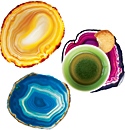 Rablabs' stunning agate coasters, large enough for an oversize mug, are "mined" out of the shallow, volcanic dirt in Brazil's Rio Grande do Sul region. The entire manufacturing process consists only of slicing and polishing. Set of four $65
Rablabs' stunning agate coasters, large enough for an oversize mug, are "mined" out of the shallow, volcanic dirt in Brazil's Rio Grande do Sul region. The entire manufacturing process consists only of slicing and polishing. Set of four $65
For the Tech-geek Trekker
 Voltaic solar backpacks and messenger bags, made mostly of recycled plastic bottles, can convert a day's worth of sunlight into a full charge for a laptop, cell phone, or MP3 player. The totes come with a battery pack, adapters, and space-age style. Starting at $199
Voltaic solar backpacks and messenger bags, made mostly of recycled plastic bottles, can convert a day's worth of sunlight into a full charge for a laptop, cell phone, or MP3 player. The totes come with a battery pack, adapters, and space-age style. Starting at $199
 For the Green Fashionista
For the Green Fashionista
Get her a well-fitting T-shirt from Gramicci (starting at $19). Some are organic, some hemp, some recycled, some reversible, some printed with eco-positive messages like "Live green."
 Pair the shirt with a so-simple-it's-cool bracelet from Wear Your Music, handmade of recycled silver commingled with guitar strings strummed by famous rockers likeBen Lee ($50), Jack Johnson ($150), Joan Jett ($200), or Eric Clapton ($500). Profits are donated to artist-selected charities.
Pair the shirt with a so-simple-it's-cool bracelet from Wear Your Music, handmade of recycled silver commingled with guitar strings strummed by famous rockers likeBen Lee ($50), Jack Johnson ($150), Joan Jett ($200), or Eric Clapton ($500). Profits are donated to artist-selected charities.
For the Workaholic
 Simpletech by Hitachi makes the greenest external hard drive we've seen. The 500-gigabyte [re]drive has a shell of bamboo and recyclable aluminum, comes in minimal packaging, and can use 90 percent less energy than a typical external drive. It's also fast and PC- and Mac-compatible. $100
Simpletech by Hitachi makes the greenest external hard drive we've seen. The 500-gigabyte [re]drive has a shell of bamboo and recyclable aluminum, comes in minimal packaging, and can use 90 percent less energy than a typical external drive. It's also fast and PC- and Mac-compatible. $100
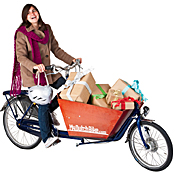 For the Urban Explorer
For the Urban Explorer
If your budget's unlimited, pick out a set of wheels from My Dutch Bike (left), which start at $1,399. They're imported from Amsterdam and can be fitted to carry kids or packages in uebercool, emission-free style. Or consider a bike from Electra. They start around a more reasonable $300 and mix a vintage American look with German and, yes, Dutch influences.
Trendsetter
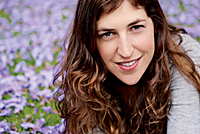
Mayim Bialik, actress, academic, and natural parent"Much as I feel that the green bar has been lowered, there's still a way to go in terms of tolerance and understanding."
--Mayim Bialik
You may remember her as Blossom from that eponymous sitcom. But since the series ended in 1995, Mayim Bialik, now 33, has truly blossomed. She's earned a Ph.D. in neuroscience from UCLA, married her college sweetheart, taken on more acting roles, and had two sons. She's the celebrity spokesperson for the nonprofit Holistic Moms Network, which promotes mothering practices she'd already espoused: a vegetarian diet, Waldorf-inspired education, a mostly media-free environment, bed sharing, slings instead of strollers, and homemade hygiene products. When Sierra interviewed her by phone, it was over happy background noises made by kids and cats.
Q: Many child actors succumb to materialism. Why not you?
A: I come from a very poor background. My grandparents were immigrants from eastern Europe, so I always identified with a modest lifestyle.
Q: Cloth or disposable diapers?
A: Cloth when we're out. At home we use "elimination communication," which is common in many parts of the world. When I first learned about it, I thought it was the craziest thing. It's a diaper-free movement that's based on the fact that children give signals. It's a really profound level of communicating. It's not for everyone, that's for sure. You need to be with your child all the time to learn the signals. Our second son was dry by 11 months.
Q: Many think this type of parenting is reserved for the privileged. Is it?
A: Most holistic parents are stay-at-home moms and not by any means living a life of luxury. It comes down to what you feel is important. I know people all over this country who'd rather live in a less expensive house and work at home in order to be their child's primary caregiver.
ON THE WEB For a longer version of this interview, go to sierraclub.org/greenlife.
A Sustained Buzz
Like your coffee tasty and ecofriendly? Five experts filter their favorites.
The coffee industry needs to wake up and smell itself. As it profits from the global caffeine jones, many of the biggest producers continue to buy beans from growers who slash rainforests and exploit workers. With that in mind (and steaming cup in hand), Sierra invited top coffee experts to recommend their favorite ethical brands. We imposed two rules: They could only pick growers, importers, or roasters with clear planet-positive practices, and they couldn't push any products in which they have a financial stake. (Next issue, experts recommend teas.)
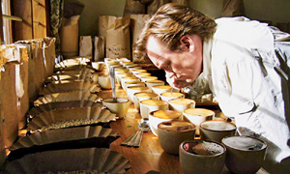 DOUG WELSH
DOUG WELSH is the chief taster, purchaser, and blender at
Peet's Coffee and Tea, a Bay Area–based chain that operates the nation's first gold-certified LEED roasting facility and has been crafting artisan coffee since 1966.
"Sebastopol, California's TAYLOR MAID FARMS uses smokeless, energy-efficient roasting machines, hand-manufactured locally. Its community-funded stores guarantee local investors an 8 percent return and employees a living wage. Their beans come in reusable, recyclable steel cans. Refill one with Don Oswaldo ($10.75 for 10 oz.), a Rainforest Alliance- and organic-certified product from a Colombian farm that boasts a bird-research center. The brew, from heirloom typica beans, is beautifully sweet and balanced with nuanced flavor."
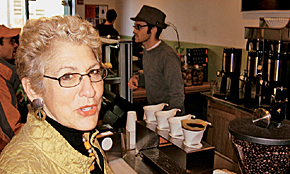 MICHAELE WEISSMAN
MICHAELE WEISSMAN wrote
God in a Cup: The Obsessive Quest for the Perfect Coffee (Wiley, 2008), about how coffee gets from Third World farm to First World cup. She lives in Chevy Chase, Maryland.
"COUNTER CULTURE COFFEE makes Kuta ($10.35 for 12 oz.), which is from Papua New Guinea's Waghi Valley and is my current favorite coffee. This syrupy, rich bean tastes of chocolate and cherries, pairing power with a surprising clean finish. On the mouth it feels like a long, slow dance on a hot summer night. Kuta grows on small, heavily shaded highland farms in some of the richest unadulterated soil amid almost unimaginable biodiversity. Committed to organics and fair labor practices, the company, based in Durham, North Carolina, is creating a market for responsibly grown, world-class specialty coffee."
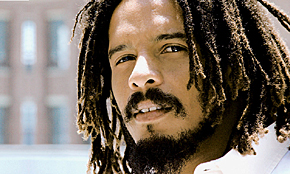 ROHAN MARLEY
ROHAN MARLEY is Bob Marley's son and the cofounder of
Marley Coffee, which sells organic shade-grown coffee from offices in Jamaica, Los Angeles, and Vancouver.
"Vancouver's CUPPAJOE COFFEE is a great model for an ecofriendly company. Their Sumatra Takengon Organic ($15.75 for 16 oz.) city roast from Indonesia is produced by the Gayo Organic Coffee Farmers Association, a multiethnic co-op that has renovated local mosques, developed a savings program, and constructed houses for Javanese refugees. The flavor has a velvety richness and a full body while maintaining a clean, sweet nature. Classic Sumatra earthiness is accompanied by notes of fruit and smoky hints of spice and cocoa."
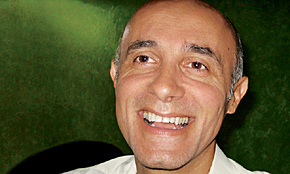 DANIELE GIOVANNUCCI
DANIELE GIOVANNUCCI is one of the world's leading organic-coffee experts. He is a former consultant to the World Bank and a cofounder of the
Committee on Sustainability Assessment, a global consortium that evaluates ecological initiatives. He lives near Philadelphia and has written several industry reports, including The State of Sustainable Coffee.
"Coffee should embody a commitment to the environment and social justice. And it should taste great. A current favorite: Serpentes Allegres ($14 for 12 oz.), from a Brazilian farm that converted to organic and started social programs. It's available from an extraordinary group called the ORGANIC COFFEE CARTEL, which gives 51 percent of its profits to charities that support farmers. Nobody takes a salary. The Serpentes Allegres has sweet pipe-tobacco aromatics, allspice notes, a viscous body, and a buttery finish."
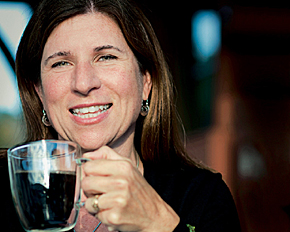 LINDSEY BOLGER
LINDSEY BOLGER is the director of coffee sourcing at Vermont's
Green Mountain Coffee Roasters. Gourmet Retailer magazine named her one of the 25 people who shaped the specialty-coffee industry. She sits on the Cup of Excellence jury and works with farmers and coffee-producing communities to improve their products and develop sustainable growing practices.
"One of the most impressive sustainable coffee operations I've seen is SELVA NEGRA ($10.85 for 16 oz.), in the mountains just north of Matagalpa, Nicaragua. The owners are on the cutting edge of sustainable production yet are constantly in search of new methods. Coffee rows are mulched with algae from local ponds. Natural pest controls are made with chilies and soapy water. Coffee-processing water goes to a biodigester, where the methane gas it produces is used for cooking. Their efforts are evident in the quality of their beans, which have cane sugar aromatics followed by notes of caramel and baker's chocolate. A zip of orange zest enlivens the vanilla-custard body and clean finish."
Gift guide photos: Lori Eanes (4), backpack courtesy of Voltaic Systems, shirt courtey of Gramicci, hard drive courtesy of SimpleTech
Mayim Bialik photo by Denise Herrick Borchert
Coffee photos: left column, courtesy of Peet's Coffee & Tea, Trish Rothgeb, courtesy of Rohan Marley; right column, Ashley Tappan-Giovannucci, Brett Simison; used with permission